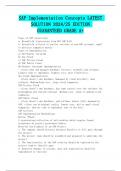Exam (elaborations)
SAP Implementation Concepts LATEST SOLUTION 2024/25 EDITION GUARANTEED GRADE A+
- Course
- Institution
Types of SAP conversions a. Brownfield (conversions from ECC SAP 6.0) b. Greenfield (clients in earlier versions or non-SAP systems), small to mid-size companies mostly Types of Implementation a) On-Premise (on-prem) b) Any Cloud c) SAP Private Cloud d) SAP Public Cloud On-Premise (on-prem)...
[Show more]



